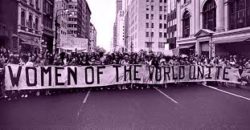International Women's Day Event: Women in Focus

By Poppy Cohen
On the 8th March 2021, the Leeds Human Rights Journal ran an event with POLIS Society called ‘Women in Focus’ in honour of International Women’s Day. We were incredibly lucky to be joined by three speakers from the University, Dr Lata Narayanaswamy, Dr Laura Loyola-Hernández and Dr Louise Pears who spoke about their research and surrounding issues.
We began hearing from Dr Narayanaswamy about the professionalisation and decolonisation of global gender equality norms. She spoke about how the discourse of gender is in professional English; in language, tone and exclusive technocratic spaces such as international conferences. This exemplifies how “the greatest feat of western hegemony has been to convince us that the way we live, is the natural course of things … the only inevitable version.” As a result, non-Western experiences of gender inequality are excluded because there is no challenge to the structural constraints of the institutionalised way of knowing.
We then heard from Dr Loyola-Hernández about Al Glitter de Guerra (Glitter War): social media as a tool of feminist protest in Latin America. She spoke about how social media and art, and protest and taking to the street, is being used to combat ‘Feminicidio’, the name given to gender-based violence in Latin America. Poignantly, Dr Loyola-Hernández stated that “being a woman in Mexico right now, and in Latin America in general, puts your life at risk”. Many of the examples and events were recent or happening as we speak, and her presentation was both consciousness and awareness-raising.
The final speaker was Dr Pears on military masculinities and women soldiers. She spoke about the role of popular culture as a place where “common sense” is established; what’s normal and what’s taken for granted in our conceptions of masculinities. The military is considered as a place where masculinities are learned and taught. Interestingly, she questioned whether this could be a moment where elite ideas of masculinity are being rejected. In keeping with our Journal theme of transition this year, the inclusion of military women in popular culture could be a point of change.
Upon reflection, what was perhaps most thought-provoking was the speakers as well as their work. All three speakers were self-conscious, potentially as far as self-critical, of their own position as the researcher in the systems in which they were describing. Dr Narayanaswamy spoke about the “irony of coming to a zoom meeting at a university to talk about norms spoken in English and speaking in English”, after light-heartedly criticising her experience of voluntourism. In a similar way, Dr Loyola-Hernández spoke of the challenges of working from “within the colonial institution”, which is “individualistic” and “crushes” attempts to work purely with and for communities.
The answer, then, and what I believe was the key takeaway for us on International Women’s Day, is to challenge individualistic norms and check our egos to really work together to empower and amplify other voices. Whether this is having a critical reflection on where you’ve come from and where the knowledge you value comes from (Dr Pears) or working outside of the institution to create true community spaces (Dr Loyola-Hernández), there is so much to be learnt by other voices. As Dr Narayanswamay put it, “there is no pure knowledge or insight waiting to be discovered … we just need to get better at listening”.
Poppy Cohen – Managing Editor of Leeds Human Rights Journal 2020/21
